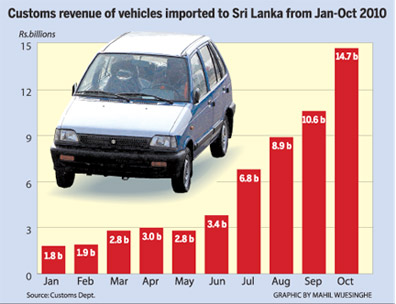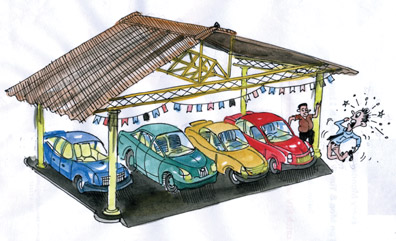|
Reduction in import duty:
Second-hand vehicle buyers yet to benefit
By Manjula Fernando
The total duty and tax payable to Customs
(Reconditioned)
Small cars less than 990cc - Rs. 1.1m - 1.4m
Cars less than 1290 cc - Rs. 1.3m - Rs. 1.5m
Cars less than 1490 cc - Rs. 1.2m to 2.6m
Vans diesel (approx.) - Rs. 2.6m
Jeeps and SUVs less than 2360cc - Rs. 2.9m - Rs. 4.2m
The rate is the average for popular brands like Toyota/Nissan
 Aspiring vehicle buyers who expected a drastic price slash in the
reconditioned and used vehicle market after the duty concession by the
Government in June are still waiting for the miracle to happen. Aspiring vehicle buyers who expected a drastic price slash in the
reconditioned and used vehicle market after the duty concession by the
Government in June are still waiting for the miracle to happen.
It has been five months since the new tariff regime was introduced
cutting down the duty and other levies imposed at the Customs by half.
Despite the highly appreciated boon, the prices of reconditioned and
used vehicles remain unchanged, if not marked an upward in the price
board much to the disappointment of the middle-class buyers.
“One reason is the sudden surge in the demand and the rush by Lankan
vehicle importers at Japanese auctions to grab every popular brand.
The rush had caused the prices to shoot up. Those who buy at high
rates have to sell at high prices too,” a car dealer in Nugegoda told
Sunday Observer explaining why the prices have remained high despite the
tax benefit.
With the new tariff revision the importers expected a sudden increase
in demand here - their reaction was to order used vehicles in bulk.
Number of vehicles imported
Reconditioned January June July August September October
Cars 56 526 1,648 2,760 3,125 3,139
Vans 6 74 276 353 320 358
Jeeps/Cabs 36 34 128 155 106 127
M/bicycles 11 319 359 1,305 118 422
Brand new
Cars 149 171 638 1,085 1,521 2,576
Vans 2 11 16 14 26 30
Jeeps/Cabs 62 76 143 142 158 173
M/Bicycles 8,362 15,011 22,012 23,919 22,558 20,659
Source: Customs Department |
He said not the seasoned and authentic importers but new people who
had surfaced with the idea of exploiting the situation have created
chaos. “Their presence in car auctions overseas has left other buyers
dumb-founded.”
This claim was corroborated by the Customs Department officials and a
number of vehicle importers.
Going by these claims, it seems that the benefit of Sri Lankan tax
concession has gone to Japanese auctioneers. But it is also claimed that
the importers have stretched their profit margins in order to keep the
prices stable hoping that there will be a ‘reverse’ in the tax regime
through the 2011 Budget.
Some of the car importers in their rush to import as many vehicles as
possible have ordered more than what they could bargain for. Already
there are several shipments at the port waiting clearance. “These people
may have to sell at cost since the Government is not in a mood to revise
the reduced rates during the upcoming budget,” a Customs official said.
However, the Customs Department seems to have got their share of the
advantage by the Government’s move. The Customs revenue has skyrocketed
during the four months after the new tax regime came into operation.
“There was a four-fold increase in the Customs revenue from vehicle
imports in October as against June 2010,” Customs Motor Vehicles Unit
Head, K. Premanath said.
This was a record income for the Unit and the number of vehicles
imported shows a steady increase from January with 15,000 to August,
September and October 30,000, 42,000 and 40,000 respectively.
The revenue collected from vehicle imports for the months of June,
July, August, September and October were Rs. 3.5 billion, Rs. 6.8
billion, Rs. 8.9 billion, Rs. 10.6 billion and Rs. 14.7 billion
respectively. This is a major increase when compared to the revenue
collected in January Rs. 1.8 billion.
Premanath said there was a surge in vehicle imports in brand new and
reconditioned categories after the June tax revision.
Without the anticipated price slash in the reconditioned market some
of the buyers have shifted their attention to brand new budget cars in
the market, the reason being that brand new car prices have dropped
almost by half following the new reduced taxes.
The car agents said that there is a marked increase in their sales
during the past few months. The highest demand was for budget and
economy cars.
A sales person in a used car dealer’s shop said their sales dropped
within the first month after the new tax regime was introduced. But
since the reconditioned market did not indicate a sufficient drop in
prices, their sales bounced back.
 The average sale for this particular used car dealer had been 25-30
vehicles a month before June. Soon after the new tax regime was
introduced this had dropped to less than 20. “We sell more than 30 used
vehicles a month now. The average sale for this particular used car dealer had been 25-30
vehicles a month before June. Soon after the new tax regime was
introduced this had dropped to less than 20. “We sell more than 30 used
vehicles a month now.
The vehicle importers’ decision to manipulate the prices seems to
have boomeranged.”
The news of the new tax regime worried mostly the used car dealers.
They feared the drop in import taxes will be an incentive for the
people to go for brand new and reconditioned vehicles instead of locally
used cars.
But the actual story turned out to be a different one.
Clarifying that there had not been any hidden charges Premanath said
“the amounts payable to the Customs have dropped hugely after the new
tax regime was introduced.”
“We calculate the duty and other levies by depreciating the Agent’s
value. That’s way the tax for a particular vehicle category remains the
same.”
The total duty and tax payable to Customs
(Reconditioned)
Small cars less than 990cc - Rs. 1.1m - 1.4m
Cars less than 1290 cc - Rs. 1.3m - Rs. 1.5m
Cars less than 1490 cc - Rs. 1.2m to 2.6m
Vans diesel (approx.) - Rs. 2.6m
Jeeps and SUVs less than 2360cc - Rs. 2.9m - Rs. 4.2m
The rate is the average for popular brands
like Toyota/Nissan |
For instance to get a Toyota Vitz (1290cc - year 2006) cleared at the
Customs counter the importer should pay between Rs. 1.3 million - Rs.
1.5 million now.
This includes all taxes and import duty.
The tax component for this type of a car was nearly double this
amount before June 2010.
Nevertheless, a close survey of the market prices shows no
significant reduction in reconditioned vehicle prices.
As feared, it seems the import tax concession has not trickled down
to the end consumer but instead served to fatten the profit margins of
middlemen here and abroad. |

